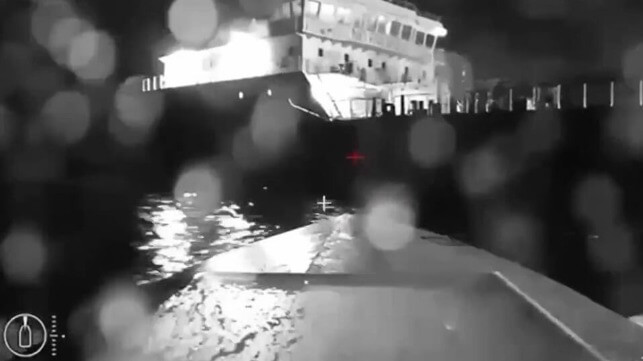Ukraine's Threat to Russian Black Sea Shipping Could Raise Rates

Ukraine's decision to strike a Russian tanker near the Kerch Strait could have financial implications for the foreign-flag tankers that carry Russia's Black Sea crude exports to market. Overall war risk insurance costs for the region might rise after last weekend's attack on a Russian vessel, and so might freight rates for tankers.
On Friday, a Ukrainian drone boat struck and damaged a Russian product tanker near the Kerch Strait, a Ukrainian intelligence officer confirmed to western media. The tanker has been identified as the Sig, which has been under U.S. sanctions since 2019 for its role in transporting jet fuel to Russian forces in Syria. The drone boat struck the tanker below the pilothouse on the starboard side, damaging the superstructure and causing flooding in the engine room. The vessel did not sink and salvage operations began immediately.
The attack may be viewed in the context of a broader Ukrainian effort to disrupt Russia's logistics chain to occupied Kherson province, where the Ukrainian Army is engaged in a difficult fight against entrenched Russian forces.
More broadly, Ukraine has declared a "war risk area" for all vessels at the anchorages and harbors of six Russian ports on the northeastern coast of the Black Sea - Anapa, Novorossyisk, Gelendzhyk, Tuapse, Sochi and Taman. Novorossyisk is the primary export loading port for Russian oil on the Black Sea (and the primary loading port for Kazakhstan's oil exports).
These developments mirror Russian attempts to block Ukrainian grain exports. Russia has repeatedly attacked Ukrainian grain terminals near Odesa and along the northern branch of the Danube. This has physically reduced the capacity of these ports to transfer grain, eliminated war risk cover for Ukraine's Black Sea ports, and reduced the availability of cover for the Danube ports.
Ukraine's Ministry of Defense cast the decision to threaten Russian Black Sea shipping in a historical light. In a statement, Ukraine noted that Russia had used Black Sea waters for amphibious warfare operations against Georgia in 2008, as well as the ongoing Russian sealift to support Syrian dictator Bashar al-Assad.

that matters most
Get the latest maritime news delivered to your inbox daily.
"Since 1991, Russia has systematically used the territorial waters of Ukraine to organize armed aggressions," the ministry said. "Today, they terrorize peaceful Ukrainian cities and destroy grain, condemning hundreds of millions to starvation. It's time to say to the Russian killers, 'It’s enough.' There are no more safe waters or peaceful harbors for you in the Black and Azov Seas."
The impact of this policy on foreign-flag shipping remains to be seen. So far, Western shipowners and insurers seem unfazed by an isolated attack on one Russian-flagged tanker, according to industry media. However, Kpler oil analyst Viktor Katona predicted that the price of shipping Russian oil from the Black Sea to India could rise by up to 50 percent as a consequence of the new Ukrainian threat. “Freight rates will be ballooning next week as the risks of carrying anything across the Black Sea proliferate,” he told Bloomberg. “Some 2.5 million barrels a day of crude and products flows are endangered by the flareup."
